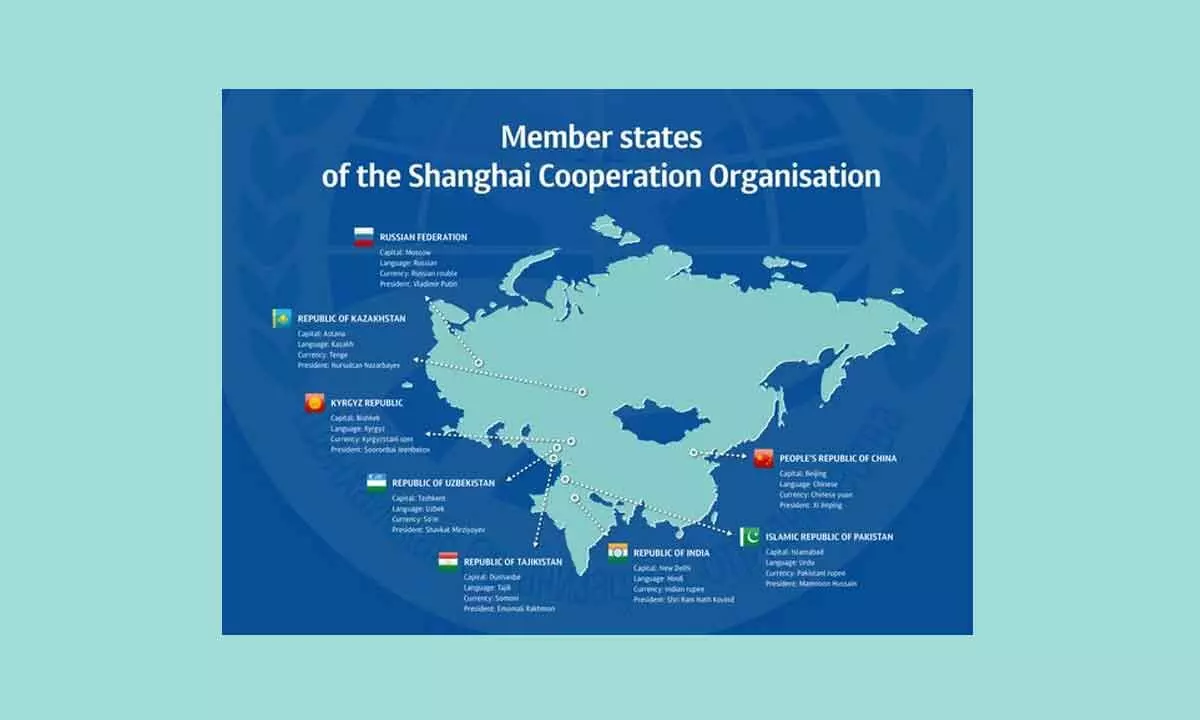Can SCO members set aside their disputes and find shared interests?
Major shortcomings, such as institutional weaknesses, a lack of common financial funds for the implementation of joint projects and conflicting national interests have prevented the SCO from achieving a higher level of regional cooperation
image for illustrative purpose

Given China and Pakistan’s hostile and confrontational behaviour towards India and added to it, President Putin’s dependency on President XI for support on Ukraine, will India be allowed to chart a unique course for SCO members?
The Shanghai Cooperation Organization (SCO) is the world’s largest regional organisation in terms of geographic scope and population, covering approximately 60 per cent of the area of Eurasia and 40 per cent of the world population; however, the grouping has multiple conflicts of interest ranging from territorial disputes, incompatible foreign policy, trade war etc., that will hamper the organisation in achieving its full objectives, especially those on trade and commerce.
SCO, which currently comprises eight member States- China, India, Kazakhstan, Kyrgyzstan, Russia, Pakistan, Tajikistan and Uzbekistan, is an intergovernmental organisation that was founded in Shanghai on 15 June, 2001.
Of the four major members, three - India, China and Pakistan are locked in territorial dispute, which creates a roadblock in achieving the core objective of SCO, which is regional security, fight against regional terrorism, ethnic separatism and religious extremism. Shekar Gupta, a noted Indian journalist in his show ‘National Interest’ on YouTube, says New Delhi is caught in a ‘pincer’ between Beijing and Islamabad, limiting India’s growth on multiple fronts.
Russia and China are the two biggest nations in terms of land mass in the SCO, while Moscow is embroiled in Ukraine War, Beijing’s hegemonic behaviour over Taiwan, in the South-China Sea and on India’s eastern borders, coupled with its wolf-warrior diplomacy across the globe, has sapped these two nations of their diplomatic bandwidth thereby, limiting them from promoting the shared interest among the group.
Afghanistan, Belarus, Iran, and Mongolia are the four Observer States interested in acceding to full membership- with Kabul under the control of Talibanment offering no immediate value to the organisation. Of the six ‘Dialogue Partners’ baring Armenia, Azerbaijan, and Cambodia, the other three, Nepal, Sri Lanka and Turkey, struggle with political chaos, economic crisis and regional conflict, respectively. This grouping covers over 60 per cent of the Eurasian landmass, 30 per cent of the global GDP, and 40 per cent of the world population.
Given the challenges facing various partner States and the post-Covid diplomatic fallouts, the ongoing SCO meets could have been downgraded to a reconnecting opportunity for the members. However, under PM Narendra Modi’s leadership, India has defined a vision for the grouping, titled ‘Towards a SECURE SCO.’ The aim is to encourage participating countries to find regional and subregional common grounds to work and progress together.
PM Modi, at the Qingdao Summit of the SCO in 2018, has articulated the SECURE theme- where ‘S’ for security for citizens, ‘E’ for economic development, ‘C’ for connectivity in the region, ‘U’ for unity, ‘R’ for respect of sovereignty and integrity, and ‘E for environment protection. But, given China and Pakistan’s hostile and confrontational behaviour towards India and added to it, President Putin’s dependency on President XI for support on Ukraine, will India be allowed to chart a unique course for SCO members?
In 2010, the SCO approved a procedure for admitting new members. In 2021, the decision was made to start the accession process of Iran to the SCO as a full member, and Egypt, Qatar as well as Saudi Arabia became dialogue partners. Several countries are engaged as observers or dialogue partners who could join as new member states in the coming years, and this could augur well for the organisation’s vision in the long term.
Wikipedia quoted a 2015 European Parliamentary Research Service paper concluding that the SCO has offered its members a cooperative forum to balance their conflicting interests and ease bilateral tensions. The report also stressed major shortcomings, such as institutional weaknesses, a lack of common financial funds for the implementation of joint projects and conflicting national interests have prevented the SCO from achieving a higher level of regional cooperation in other areas.
India assumed the Presidency of the SCO Council of Heads of State for the year 2023 on 17 September 2022 at Samarkand in Uzbekistan. Recently, while speaking at a meeting of the Shanghai Cooperation Organisation, Home Minister Amit Shah emphasised that New Delhi attaches special importance to the SCO in promoting dialogue on the subject of multi-dimensional political, security and economic issues. However, can China and Pakistan, the two troublemakers in the grouping, grow beyond their self-serving actions and give priority to global good is unlikely.
However, SCO members can take a leaf from the paper titled ‘Unlocking the Potential for East and North-East Asian Regional Economic Cooperation and Integration,’ published by ESCAP (Economic and Social Commission for Asia and the Pacific), the regional development arm of the UN. The report suggests, “Given the geopolitical situation in the East North East Asia (ENEA) sub-region, the most feasible way forward is through the continuation of technical cooperation in areas where national interests are closely aligned with shared sub-regional interests.” For now, all eyes will be on the upcoming SCO Summit which India will host in July. Can the members set aside their conflicts and find shared interests?
(The author is Founder of My Startup TV)

